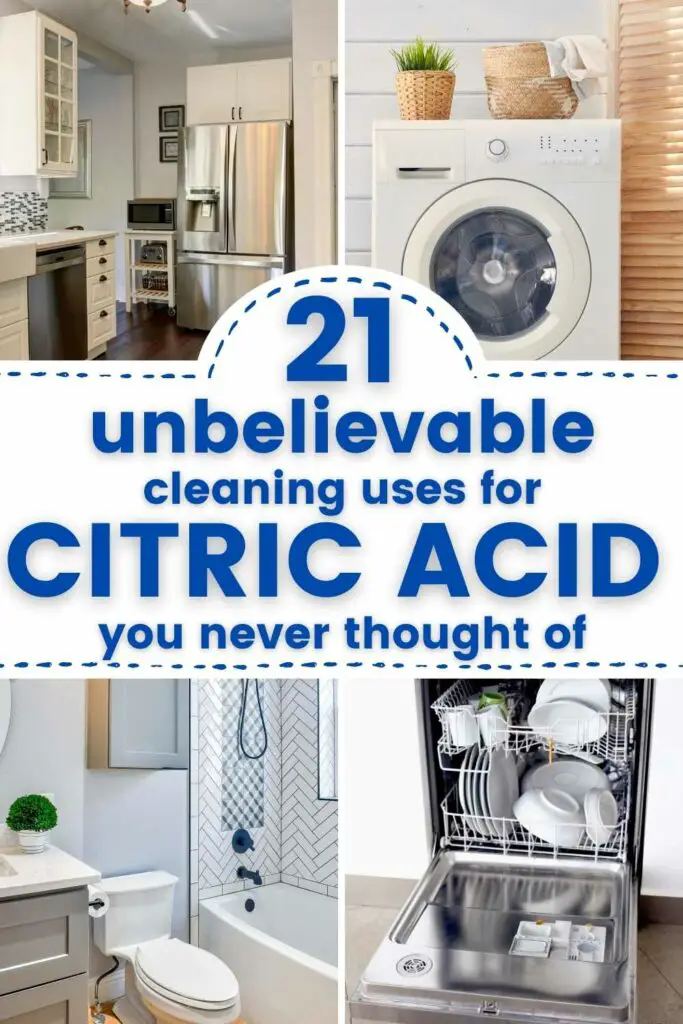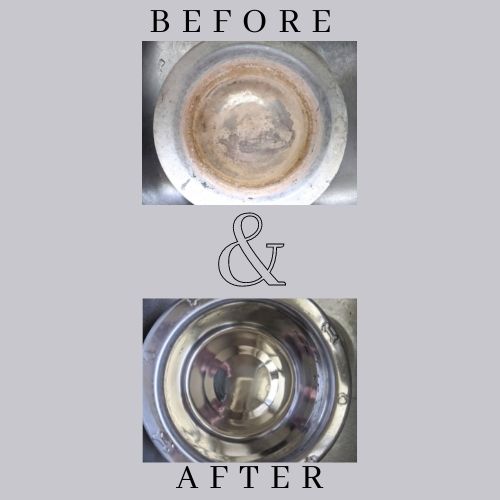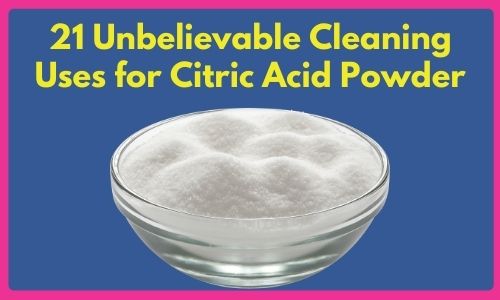Do you want to make the move towards more natural cleaning products that actually work? Have you ever needed to clean something but had no cleaning products in the house? I have recently discovered these many household cleaning uses for citric acid powder and now citric acid cleaner is a staple in my home.
Citric Acid for cleaning
Citric acid is a non-toxic, natural crystalline powder that cleans exceedingly well and is a cost-effective agent of homemade cleaners. It has no odor and has more cleaning power than vinegar. There are so many DIY uses for citric acid powder for cleaning that I buy in bulk to save money as the small quantities available at grocery stores can be pricey.
As an Amazon Associate I earn from qualifying purchases. This means if you click on a link and buy something I’ve recommended, I get a small commission at no additional cost to you. You can see my full Disclosure Policy here.
RELATED POST: How to clean a really messy room fast

What is citric acid powder?
Citric acid, also known as sour salt, is a weak organic acid found in various vegetables and fruits, but its highest concentration is in citrus fruits. Oranges and grapefruit have less than half the concentration of citric acid than lemons and limes. Citric acid is responsible for the sour taste of citric fruits like lemons, limes, oranges and grapefruit.
Historically, citric acid was produced by extracting it directly from fruits. American food chemist, James Currie, discovered in 1917 that feeding a cheap source of sugar solution to a strain of mold would produce citric acid. Industrial level production of citric acid powder started about 2 years later.

What are common uses for citric acid?
Over 2.60 million tons of citric acid was produced in 2019. It is expected to reach 3.29 million tons by 2025. The major industrial use of citric acid powder is as a flavoring and preserving agent in food and beverages.
Citric acid is also used in household detergents and cleaners because it kills bacteria, mold, and mildew and is ideal for general disinfecting and cleaning purposes. It is also a chelating agent that binds tightly to metal ions in hard water, so it’s also effective at removing hard water stains, calcium deposits, limescale, rust stains and soap scum. I use citric acid for cleaning all the time as I’m on a well.
Additionally, citric acid has antioxidant properties that stabilize or preserve pharmaceuticals and is used as an effervescent in powders and tablets. With a PH level between 3 and 6, citric acid is also used as a buffering agent in cosmetics, toiletries and other beauty products.
RELATED POST: 33 Amazing cleaning hacks that work!
DIY cleaning uses for citric acid powder
Citric acid is the active ingredient in some bathroom and kitchen cleaning products and can be used in numerous cleaning applications around the house. I recommend citric acid powder for cleaning because it’s tough on grease and antibacterial, making it a great homemade cleaning staple.
How do you mix citric acid powder for cleaning?
The basic DIY citric acid cleaning solution recipe is to mix a couple of heaping tablespoons of citric acid powder with hot water in a 16 oz spray bottle. Shake to dissolve the citric acid and you have your citric acid cleaner. Feel free to use more citric acid powder for cleaning more stubborn areas.
If you want to use this citric acid cleaner recipe on a vertical surface, add a drop or two of Dawn dishwashing liquid to promote foaming that will allow the solution to adhere to the surface for a longer period of time.

RELATED POST: Time-saving cleaning hacks for people who hate cleaning
Citric acid to clean your kitchen
Citric acid to clean countertops*
Spray citric acid cleaner on countertops and let sit for a minute or two. Wipe with a clean cloth. Citric acid will effectively remove grease and grime while it cleans and disinfects. It will also remove coffee and tea stains, yellow and brown discolorations, and hard water stains.
*NOTE: Don’t use citric acid for cleaning granite, marble, limestone, travertine, or onyx surfaces as acid can damage the finish. You are unlikely to see the damage for some time, but eventually your countertops will appear dull and may even have visible indentions.
RELATED POST: 53 Hydrogen peroxide hacks you need to know
Citric acid to clean stainless steel
Spray the citric acid solution directly onto the dirty stainless steel appliance or sink and let it soak for several minutes. Then wipe the surface with a dry cloth. Rinse the surface with water and dry it again with a clean, dry cloth. This will leave your stainless steel shiny and streak free.
Citric acid to clean faucets
Crusted calcium deposits caused by lime buildup appear in areas of hard water. Start by using soapy water and a rag to get rid of the initial build-up around your kitchen faucet including the underside and the base. Then spray your citric acid cleaner all over the faucet and base. Let sit for a few minutes while the citric acid dissolves the calcium and lime deposits. Rinse with warm water and dry with a clean cloth.
Citric acid to clean coffee makers, espresso machines and kettles
Limescale is the off-white, chalky deposit found in kettles and other appliances where hard water has evaporated. To remove those limescale and calcium deposits, run a mixture of the cleaning solution through your coffee maker or espresso machine, followed by 2 cycles of fresh water to remove all traces of citric acid. For kettles, simply fill them with the solution and bring it to a boil. Let it sit for a few minutes and watch all the deposits come out when you empty it. Rinse the kettle with fresh clean water.
RELATED POST: How to make all purpose cleaner
Citric acid to clean water and ice dispensers
Do you have hard water buildup on your fridge where the water and ice-cubes come out? Soak some cotton pads in the citric acid cleaning solution then place on the surface requiring cleaning. Leave for 10-20 minutes, depending on your build-up, then wipe off. For stubborn buildup, you may need to soak the cotton pads a couple of times.
Citric acid to clean dishwasher
Citric acid for cleaning dishwashers works in two ways; more effectively cleaning your dishes and removing mineral buildup and hard water stains in the dishwasher itself.
Citric acid is a non-toxic, natural dishwasher detergent. Add a tablespoon of citric acid to each dishwasher cycle to soften the water to remove spots from your dishes and make your glasses sparkle.
Citric acid is also an effective dishwasher cleaner. Fill the detergent dispenser with citric acid powder and run through a normal cycle. Follow up with another cycle with regular dishwasher detergent. This should remove all mineral buildup and stains inside the dishwasher.
Citric acid to clean glass stove tops
You can use a mixture of Dawn dish soap, baking soda and a citric acid powder solution to get your glass stove tops shiny and clean, just like new.
RELATED POST: How To Remove Cloudiness From Glass Top Stove
Citric acid to clean oven and toaster oven racks
Oven and toaster oven racks can get very greasy from splattering and dripping foods. Soak the racks in the citric acid cleaning solution for 20-30 minutes then use a brush to remove any burnt on food or grease.
Citric acid to clean your oven
You can even use citric acid to clean your oven! A quick way to use citric acid as an oven cleaner is to place an ovenproof pan of citric acid cleaning solution on a rack and set the oven to 500F. Let the solution steam for 30 minutes to an hour, depending on how greasy and dirty the oven is. Watch closely so that the pan doesn’t boil dry. Let the oven cool to the touch and thoroughly wipe it out with a sponge, rinsing the sponge as necessary.
Citric acid powder for cleaning your bathroom
Due to its chelating properties, citric acid cleaner is effective at removing soap scum, hard water stains, calcium deposits, limescale, and rust stains on bathtubs, showers, sinks and toilets.

Citric acid to clean bathtubs, showers, toilets and sinks
Citric acid is very effective for removing rust stains and hard water deposits in the bathroom. For detailed information on how to use citric acid to clean your bathtub, shower or sink, please see the post: How to remove rust stains from your bathtub, showers and sinks.
We also have a step-by-step guide to get rid of toilet bowl stains.
Citric acid to clean showerheads
If you have a removable showerhead, you can fill a small bucket with hot water and mix in 2 tablespoons of citric acid. Place the bucket in your tub and place the showerhead in the bucket. If your showerhead is not removable, fill a small plastic bag with hot water mixed with 2 tablespoons of citric acid and use an elastic band to secure the bag to the showerhead.
Let the showerhead sit in the solution for an hour or 2, or even overnight. Use a stiff brush to scrub off any excess buildup and then run water through your showerhead. This should dissolve any deposits from your showerhead and leave you with much stronger water pressure.
Citric acid to clean glass shower doors with hard water stains
Citric acid is the perfect cleaning agent for hard water buildup on glass shower doors. Simply spray, scrub and rinse.
Citric acid to clean grout
Citric acid cleaning solution fights mold and mildew and is a powerful grout cleaner. Simply spray on, let sit 10 minutes, then rinse. Repeat the process for stubborn areas and use an old toothbrush to scrub if necessary.
Citric acid to clean tile
Spray your citric acid cleaning solution (add a few drops of Dawn to make it foamy) onto the tile and let sit for 10-15 minutes to give it time to break up mineral deposits, dirt, and any rust or mold. Then rinse clean and wipe with a clean cloth.
Citric acid to clean mirrors
Use your citric acid cleaning solution to make your mirrors streak-free! Spray the solution on the mirror and let sit for a minute or two. Wipe with a clean, lint-free cloth.
RELATED POST: How to remove rust stains from your bathtub, showers and sinks.
Citric acid for cleaning your laundry
The water softening properties of citric acid make it an effective additive to remove stains from clothing. It’s an ingredient in most laundry detergents.
Citric acid for washing clothes
Iron is dissolved in groundwater and it oxidizes once it hits the air. This leaves particles of iron floating in your laundry water which can cause rust stains on clothes and overall yellowing of clothes. Citric acid conditions or softens the hard water, removing the iron.
Use citric acid with hydrogen peroxide to clean whites and remove stubborn rust stains in the laundry. Add ¼ cup of citric acid and ½ cup of hydrogen peroxide to each load to leave whites sparkling white without affecting the fabric. This combination also removes oil and other stubborn stains on colored clothing.
BONUS TIP: If you have hard water, do NOT use bleach in your laundry. Chlorine bleach produces iron oxide (rust) when combined with hard water and will stain your clothes.
Citric acid to clean your washing machine
Citric acid is also an effective washing machine cleaner to remove soap scum, limescale, bad smells and any build up inside the washer. Mix one cup of citric acid with half a cup of baking soda and run the machine on a hot cycle with a cold rinse. This will leave the inside of your washing machine sparkling clean and smelling fresh.
Citric acid to clean your dryer
Empty the dryer lint trap, wash and dry it and replace it. Use a citric acid solution of 2 heaping tablespoons of citric acid powder with hot water in a 16 oz spray bottle. Shake to dissolve the citric acid and spray the inside of the drum. Wipe it down with a microfiber cloth, and leave the door open so it can air dry. The spray will keep, so you can do this on a regular basis.
Citric acid to clean your Iron and Steamer
Use citric acid to clean hard water deposits off of your iron or steamer. Pour the citric acid cleaning solution into the water reservoir until it’s a third full. Turn it on to medium heat and let it steam for about 5-10 minutes so all the solution evaporates. Then, fill the chamber with fresh water and turn the iron on again to flush through traces of mineral deposits and vinegar. Wipe the base of the iron and steam vents with a paper towel.
Other cleaning uses of citric acid powder
Citric acid to clean humidifiers
To descale your humidifier with citric acid, fill the base of the humidifier with 1 cup of citric acid cleaning solution and leave it to sit for an hour. The vinegar is a natural cleanser and it’ll help loosen any residue and disinfect the small unit.
While that is sitting, clean the inside of the water reservoir by filling it with 2 cups of citric acid cleaning solution, seal it shut, and then shake it for several minutes to effectively agitate any grime. Hold the reservoir upside down and manually allow the solution to filter through the nozzle of the reservoir.
Refill the reservoir with plain water, and repeat to rinse any loosened debris from the reservoir and the nozzle.
Once the base has been soaked, pour the solution out. Use a cloth to wipe down the interior of the base and then allow it to air dry.
Citric acid to clean car wheel rims
To clean brake dust and other dirt from your car’s wheels, rub your citric acid cleaning solution on to the dirty area, leave it for a few minutes and then scrub. Repeat until the stain is gone.
Citric acid swimming pool stain remover
For stains on your pool liner or stairs, use 1 cup of citric acid per 10000 gallons of water. Citric acid is a more gentle stain remover than muriatic acid. Let your chlorine level drop very low for the citric acid to be effective. Sprinkle the citric acid over the stained areas. Let it sit for 12 hours, brush and then bring your chlorine level back to normal.
Citric acid for green hair from pool
If your pool has high copper levels, you may get green hair from the pool. Simply prepare a citric acid solution and saturate your hair with it. Let it sit for 5-10 minutes, then rinse. Shampoo and condition as normal. If the greenish tint persists, treat again.
Citric acid to clean hot water heater
To use citric acid to clean your hot water heater, pour the citric acid cleaning solution into the cold water port and wait about eight hours for the citric acid to dissolve the minerals at the bottom of the tank. Connect a hose to the drain valve located at the bottom of the water heater and run the hose out into the sink to drain. It’s very satisfying to see all the deposits coming out of the hose.
Citric acid to clean windows
If you have hard water stains on your windows, citric acid powder is the way to go. Generously spray your solution onto the window, let sit for 5-10 minutes, then wipe down with paper towels. Repeat the process until all the dirt is removed and the window is shiny and sparkling clean.

Citric acid to remove water calcium deposits from stainless steel pet bowls
Dog and cat water bowls are susceptible to calcium deposits as they always have water in them. To clean out those bowls, place it in the sink and pour a tablespoon of citric acid powder in the bowl. Fill it to overflowing with hot water. Let it sit 10-15 minutes while the citric acid does its job of eating away the calcium deposits.
Once the bowl has soaked, take a scrubbing pad and scrub away any remaining calcium deposits from the bowl. They will have softened and will be easier to remove. Rinse with hot water and refill the bowl with cold water for your pet. Citric acid is food grade, so you don’t have to worry about any remaining chemicals in the bowl.
RELATED POST: The absolute best floor cleaning machines for your home

What should you NOT use citric acid to clean?
Don’t use citric acid on granite, marble, limestone, travertine, or onyx surfaces as acid can damage the finish. You are unlikely to see the damage for some time, but eventually your countertops will appear dull and may even have visible indentions.
What cleans better? Vinegar or citric acid?
Citric acid and vinegar are both weak acids, although citric acid is a little more effective at removing mineral buildup and hard water stains. Both are excellent household cleaners.
Citric acid is a tricarboxylic acid and vinegar contains acetic acid. Either acid is an effective cleaner for mineral buildup, calcium deposits and rust stains. I prefer citric acid as it’s an easy to store powder that is always in my pantry. Additionally, some people don’t like the smell of vinegar.
Full strength vinegar can certainly be substituted for the citric acid cleaning solution for these applications, if required.
RELATED POST: 3 Simple DIY disinfectant sprays that work!
Is Citric acid bad for you?
Many people are concerned about using citric acid for cleaning because it is manufactured with the aid of mold. However, the mold is carefully filtered out of the final product, leaving it safe to consume. The FDA says “the ingredient is used in food with no limitations other than current good manufacturing practice.”
Long-term or repeated consumption may cause erosion of tooth enamel. Over-ingestion may cause abdominal pain and sore throat.
When using citric acid for cleaning, there is a slight risk of respiratory symptoms, such as a cough, shortness of breath, and a sore throat, especially in asthmatics, when using citric acid powder. Take precautions to avoid inhalation of the crystals.
As it is a mild acid, citric acid powder can cause eye irritation. Keep away from the eyes. If it comes in contact with eyes, remove any contact lenses and rinse eye(s) with water for several minutes.
RELATED POST: 22 Best House Cleaning Tools that Make Cleaning Easier
I hope this list of DIY uses for citric acid has given you some ideas for using it to clean your home. If you know of any other other applications for cleaning with citric acid, drop me a note in the comments. I would love to learn them!


I used plain citric acid to clean the scum and mineral deposits out of the bottom of my toile (10 years). The rest of the bowl was easily cleaned but not the bottom. It took patience and leaving it in overnight 2 or 3 times. Sparkling clean! Amazing!
It’s definitely a miracle worker sometimes. To speed up the process, you can try using a pumice stone 🙂
citric acid is made from aspergillus niger, Black mold. I don’t care what the manufacturer says I still get painful joints from it because I am allergic to mold, I cannot even take penicillin.
Thank you for this wonderful information. I only use natural, non-toxic cleansers. I don’t find vinegar to be particularly good at cleaning. I just bought citric acid and am looking forward to the results.
I spray the solution on weeds in between driveway & sidewalk spaces. The solution works great on mosquitoes, gnats, fruit flies, & other similar bugs. I spray all the areas they seem to like, getting into all their favorite cracks & crevices, making sure not to get it on any of my plants. The powder works great for me on ant hills, I just poke a stick deep down the hill as far as I can get it several times & then with a squirt bottle top I squeeze the citic acid powder down each of those holes & viola the ants are gone by the next day. I don’t know if I’m killing them or just relocating them, but either way I’m happy. Well, at least until the next big rain storm when I sometimes have to do it again, but we do get months of no ants in our yard.